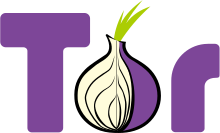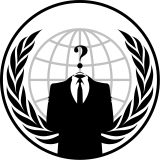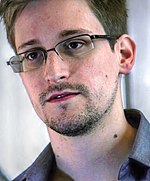Lentis/Internet Anonymity
Introduction[edit | edit source]
Internet anonymity is the idea that the identities of users on the Internet are unknown to others. Through the internet, users can take on a completely new identity or assume no identity at all. This anonymity is assumed for legal and illegal purposes. Also, there have been studies documenting how behavior changes when anonymous online. It is important to understand the desire to be anonymous online as well as why behavior changes while online.
Front-end Anonymity[edit | edit source]
Front-end anonymity means that users are not immediately identifiable to the public[1]. Front-end anonymity allows users to post content and interact with other users without fear of social repercussion. Websites like 4chan function using front-end anonymity. Users do not need a username or password and their data is stored by the website for minimal amounts of time.
Back-end Anonymity[edit | edit source]
Back-end anonymity provides a higher level of security than front-end anonymity. Users are not identifiable to the public, website administrators, or the authorities[2]. This is either achieved through not storing IP addresses or by running all internet activity through a network of servers that make it difficult to track to origin of the signal. An example of back-end anonymity is Tor.
Psychology of Anonymity[edit | edit source]

The state of anonymity comes with an awareness that one’s actions will not be met with social consequences, good or bad[3]. This has significant psychological implications, especially in the realm of online activity[4]. Before internet anonymity, the philosopher Plato considered the question of how being anonymous would affect human morality. He evoked the mythical Ring of Gyges, a ring that would make its wearer invisible, in a dialogue between him and his brother Glaucon in Republic[5]. Glaucon posited that morality is a social construction; apart from maintaining one’s reputation of virtue, moral character would cease to exist. Plato held that abusing anonymity enslaved a person to their desires; a man rationally in control himself would act no differently whether he was invisible or not.
Online Disinhibition Effect[edit | edit source]
Most situations online lack the social stigmas that apply in face-to-face encounters. This may result in a reduction of user restraint known as the Online Disinhibition Effect. Symptoms include benign tendencies, more openness with others, and less guarded emotions. Psychologists agree such users seek an emotional catharsis unavailable to them offline. Potential consequences of online disinhibition include the social phenomena of cyberbullying, trolling, and flaming. John Suler, a psychologist studying online behavior, has identified six primary factors explaining the sometimes drastic difference in online and face-to-face behavior[6]:
Dissociative Anonymity[edit | edit source]
When a person remains anonymous, it provides a sense of protection and outlet for behaviors that might be considered antisocial or harmful.
Invisibility[edit | edit source]
Typically, one cannot be seen online. Therefore, the need to concern oneself with appearance and tone of voice is lowered or absent.
Asynchronicity[edit | edit source]
Online conversations rarely happen in real time. It’s easy for someone to "speak their mind," log off, and never log back in again.
Solipsistic Introjection[edit | edit source]
Without visual cues, the human brain assigns characteristics and traits to people during online interactions. This allows fantasies to play out in an individual's mind that are not possible in real life.
Dissociative Imagination[edit | edit source]
Many see cyberspace as a place where society’s “rules” don't apply to them. Some users dissociate their online identity from the offline reality, enabling them to don said persona or shed it simply by logging on or off.
Minimization of Status and Authority[edit | edit source]
A person's real life status is generally unknown to others. The internet provides a level playing field for all users to voice their thoughts without a social hierarchy.
The Equalization Phenomenon[edit | edit source]
The Equalization Phenomenon states that in online interactions, individuals in computer-based communications interact more equally than those in face-to-face interactions[7]. Those who normally receive social favor due to physical characteristics are not given this advantage. Greater anonymity leads to a more pronounced Equalization Phenomenon. This would make online anonymity a desirable form of communication for socially disadvantaged individuals.
Motivations for Anonymity[edit | edit source]
Security[edit | edit source]
One of the primary reasons to be anonymous online is protect one’s personal identity to protect against identity theft and physical harm. Threats of physical harm could result from one’s physical address being release online (also known as doxing).[8] In order to protect against hacking, the “identity” of one’s computer must be protected, specifically its IP address.[9]
Privacy[edit | edit source]

Another reason to be anonymous online is to protect against information collection and tracking. For example, advertisements on websites often use trackers to collect information on users. One reason for using ad blockers such as Adblock Plus is to avoid tracking from ads (besides simply not seeing them).[10] Ghostery is a browser add-on created to allow the user to see what trackers are active on a site and disable undesirable ones.[11] Another example of information collection is that done by search engines such as Google. DuckDuckGo is a search engine that offers searching without tracking to users.[12]
Fabricated Identity[edit | edit source]
One reason to be anonymous, or to hide ones true identity, is to take on a different identity. This could be simply for fun, to craft an online persona,[13] or to illegally impersonate someone.[14]
Illegal Activity[edit | edit source]
Anonymity is desirable for illegal online activity in order to not get caught. Such activities include illegal online gambling, purchasing illegal drugs, piracy, and more.[15]
Online Black Markets[edit | edit source]
Using anonymous cryptocurrencies, users buy illegal items on the black market. These black market sites are located on anonymous and encrypted networks to hide user activity. This is commonly referred to as the Darknet. Through these black markets, users can buy drugs, weapons, contract killers, and illegal pornography. The anonymity of the whole system increases the difficulty for law enforcement to stop these illegal markets.
Cryptocurrency[edit | edit source]

Cryptocurrencies are a decentralized form of digital currency. They use cryptography to add new currency to the market. Most cryptocurrencies are anonymous and store no information about the user. Unlike centralized banking, government has no control over cryptocurrencies[16]. Complex algorithms are computed by users to ensure counterfeiting is not possible. They are introduced to the market using a hashing algorithm like SHA-256 or Scrypt. Bitcoin is the most popular cryptocurrency and is the currency of choice for users who want to buy illegal items online.
Tor[edit | edit source]

Tor is free software and an open network that helps you defend against traffic analysis, a form of network surveillance that threatens personal freedom and privacy, confidential business activities and relationships, and state security. It offers the user a network through several thousand nodes to obscure network traffic. Then, on top of that, it encrypts the network traffic on the application layer. The Tor network also incorporates hidden services on the network that can not be accessed on the normal internet. These services are where illegal activities are hosted. This network of hidden services is what is commonly referred to as the Darknet. This network can only be accessed by users using a special Tor browser[17][18].
The Silk Road[edit | edit source]
Silk Road was an online black market and the first modern darknet market started in 2011, best known as a platform for selling illegal drugs. It was operated as a Tor hidden service[19]. Users could create an account a view a website that looked as legitimate as eBay or Amazon. In March 2013, there were over 10,000 listings on the sight, 70% of which were drugs and erotica, books, and fake IDs making up the rest[20]. Users could buy the items with bitcoin and get them shipped straight to their door. Being a Tor hidden service where bitcoin is the main currency, the users and their purchases are completely anonymous and hard to trace.
In October 2013, after an FBI sting operation, the website was shut down[21]. Ross Ulbricht, the site's founder, was convicted of eight charges related to Silk Road in U.S. Federal Court in Manhattan and was sentenced to life in prison without possibility of parole[22]. There were estimated to be $15 million in transactions on The Silk Road before it was shut down[23]. A new version, Silk Road 3 Relaunched, has opened in January 2015.[24] It may take an extended period of time to track down the location of this site and shut it down due to its hidden location on the Tor network.
Participants and Cases[edit | edit source]
Tinkebell[edit | edit source]
In 2004, a Dutch artist broke the neck of her dying cat and used the fur to make a handbag. She posted a tutorial, with photos of the finished product, on her blog and sparked outrage from all over the world. She received so many hate mail and death threats from anonymous people, that she began to wonder who wanted her dead[25]. She answered this question by finding the personal information of the authors of many death threats and publishing all of the information in a book titled: Dearest Tinkebell. The book is no longer for sale due to copyright and privacy issues, but the case highlights the fragility of front-end anonymity. Many of the death threats written to Tinkebell anonymously were from “people who appeared quite normal: sweet-looking teenage girls, policeman, housewives, and office workers” who felt empowered to say dangerous things under the “protection” of front-end anonymity[26].
Anonymous[edit | edit source]

Anonymous is a loosely organized network of “hacktivists” who operate according to the “principles of truth, justice, and morality”[28]. Anonymous has no formal leadership, so these ‘Principles of Operation’ are entirely subjective. However, there is an official website (link) and a facebook page with over 5.5 million ‘likes’, which indicates rudimentary levels of organized activity. Anonymous was created on 4chan, an epicenter of online anonymity. The website functions on an front-end anonymity platform; users do not need to login and their IP address is stored for a very short time. Administrators have the ability to block people by their IP address if illegal activity occurs, but self-policing is extremely common[29]. The original Anonymous hackers were brought together from this culture and took on their first high-profile case in 2008: Project Chanology. Project Chanology was a protest that aimed to “expel the chruch from the Internet” in response the Church of Scientology’s attempts to delete one of Tom Cruise’s interviews[30].

Anti-tracking software developers[edit | edit source]
Edward Snowden’s 2013 exposure of the National Security Agency’s surveillance activities caused the “Snowden Effect,” an increased interest in information security and privacy.[31] Software developers can take advantage of this demand to sell products providing anti-tracking capabilities or services. These can include anti-advertisement tracking such as Adblock Plus, anti-search engine tracking such as DuckDuckGo, and anti-website tracking such as Ghostery. All these examples are free to use, but they make money through various means: Adblock Plus takes contributions from large companies that want to “whitelist” their ads,[32] DuckDuckGo has ads (although subtle and non-tracking),[33] and Ghostery actually has a “support” option that if enabled, allows the extension to sell information to advertisers about what trackers users decide to block.[34]
The Electronic Frontier Foundation[edit | edit source]
The EFF is the “leading nonprofit organization defending civil liberties in the digital world.”[35] The group seeks to shift the balance of power online towards users through exposing government misconduct, challenging litigation infringing on online rights, and supporting technologies that preserve personal freedoms. Pertaining to online anonymity, the EFF has been involved in numerous court cases since its founding in 1990. One court observation effectively summarizes the organization's perspective, "The free exchange of ideas on the Internet is driven in large part by the ability of Internet users to communicate anonymously."[36]The Electronic Frontier Foundation represents one of a larger group of organized groups defending the right to remain anonymous online. Other such groups include the American Civil Liberties Union and Freenet Project.
Authors: Pen Names[edit | edit source]
Some authors, who publish their work online, will use a pen name to keep their true identity a secret. They use these pen names for privacy, branding, and avoiding confusions with other authors of the same name. An industry professional may not want to be associated with the blog that they post online[37]. Joanne Rowling, the acclaimed author of the Harry Potter book series, wrote under the pen name J.K. Rowling, because she anticipating that the target audience of young boys might not want to read a book written by a woman[38]. Stephen King used the pen name Richard Bachman because there was a stigma early in his career that the public would only accept one book a year from an author[39]. Although neither of these authors published their books online, it is an example of why an author would want anonymity in any medium.
References[edit | edit source]
- ↑ Bidgoli, H. Handbook of Information Security, Information Warfare, Social, Legal, and International Issues and Security Foundations. John Wiley & Sons. 2006.
- ↑ Wang, G., Indrakshi, R., Calero, J. M. A., & Thampi, S. M. Security, Privacy, and Anonymity in Computation, Communication, and Storage: 9th International Conference, SpaCCS 2016, Zhangjiajie, China, November 16-18, 2016, Proceedings. Springer. Retrieved 12 December 2016.
- ↑ Christopherson, K. M. The positive and negative implications of anonymity in Internet social interactions: “On the Internet, Nobody Knows You’re a Dog”. Computers in Human Behavior, 23(6), 3038-3056. November 2007. Retrieved 12 December 2016.
- ↑ Crayco, K. Journal of Undergraduate Psychological Research, 2, 34-37. 2007. Retrieved 12 December 2016
- ↑ Plato, Emlyn-Jones, C. J., & Preddy, W. Republic. Cambridge, MA: Harvard University Press. 2013.
- ↑ Suler, J. filename=The_online_disinhibition_effect.pdf The Online Disinhibition Effect. CyberPsychology & Behavior, 7(3), 321-326. 2004. Retrieved 12 December 2016.
- ↑ Dubrovsky, V. J., Kiesler, S., & Sethna, B. N. The Equalization Phenomenon: Status Effects in Computer-Mediated and Face-to-Face Decision-Making Groups. Human–Computer Interaction, 6(2), 119–146. 1991. Retrieved 12 December 2016.
- ↑ Hitch, Derek. What is Doxing and how to protect personal identity against Doxing?. TechGYD. Retrieved 11 December 2016.
- ↑ Schofield, Jack. How can I protect my PC's privacy, and my IP address? The Guardian. 5 July 2013. Retrieved 11 December 2016.
- ↑ Adblock Plus About page. Retrieved 11 December 2016.
- ↑ Ghostery Browser Extension page. Retrieved 11 December 2016.
- ↑ DuckDuckGo About page. Retrieved 11 December 2016.
- ↑ Tynan, Dan. The Secret To Creating An Alternative Online Identity Is Doing It In Plain Sight. Forbes. Retrieved 11 December 2016.
- ↑ USA.gov. Identity Theft. Retrieved 11 December 2016.
- ↑ Brighthub.com. Definition of Cybercrime. Retrieved 11 December 2016.
- ↑ Carter, Graydon. What is Cryptocurrency?, Cryptocoins News. 16 September 2014. Retrieved 8 December 2016.
- ↑ Tor:Overview, TorProject.org. Retrieved 8 December 2016.
- ↑ Zetter, Kim (17 May 2005). "Tor Torches Online Tracking". http://archive.wired.com/politics/security/news/2005/05/67542?currentPage=all. Retrieved 12 December 2016.
- ↑ Lee, Nicole. Anonymity is dead and other lessons from the Silk Road trial, engaget. 8 February 2015. Retrieved 8 December 2016.
- ↑ Ball, James. Silk Road: the online drug marketplace that officials seem powerless to stop, The Guardian. 22 March 2013. Retrieved 8 December 2016.
- ↑ Leger, Donna L. How FBI brought down cyber-underworld site Silk Road, USA Today. 15 May 2014. Retrieved 8 December 2016.
- ↑ Weiser, Benjamin. Ross Ulbricht, Creator of Silk Road Website, Is Sentenced to Life in Prison, The New York Times. 29 May 2015. Retrieved 8 December 2016.
- ↑ Christin, Nicolas. [https://www.andrew.cmu.edu/user/nicolasc/publications/Christin-WWW13.pdf Traveling the Silk Road:A Measurement Analysis of a Large Anonymous Online Marketplace], Carnegie Mellon INI/CyLab. Retrieved 8 December 2016.
- ↑ The Silk Road Drugs. silkroaddrugs.org. 12 December 2016.
- ↑ Tinkebell. Online Anonymity: You Want Me Dead, but Who Are You Anyway?. 2 February 2015. Retrieved 12 December 2016.
- ↑ Online anonymity: you want me dead, but who are you anyway?. The Guardian. 20 April 2012. Retrieved 12 December 2016.
- ↑ "Gabriella Coleman on Anonymous". Brian Lehrer Live. Vimeo. February 9, 2011. Retrieved December 12, 2016.
- ↑ Anonymous. Anonymous Facebook Page Retrieved 12 December 2016.
- ↑ Poole", C. “moot.” (n.d.). The case for anonymity online. Retrieved 12 December 2016.
- ↑ Proper Gander. (n.d.). Anonymous and the Church of Scientology - Project Chanology. Retrieved 12 December 2016.
- ↑ Snowden effect definition. whatis.com. Retrieved 11 December 2016.
- ↑ Scherschel, Fabian. Serious accusations against AdBlock Plus. The H. Retrieved 11 December 2016.
- ↑ DuckDuckGo. Search to observe ads at top of list for certain searches. Retrieved 11 December 2016.
- ↑ Henry, Alan. Ad-Blocker Ghostery Actually Helps Advertisers, If You "Support" It. 19 June 2013. Retrieved 11 December 2016.
- ↑ About EFF. https://www.eff.org/about
- ↑ Anonymity. Electonic Frontier Foundation. Retrieved 12 December 2016.
- ↑ Sedwick, Helen. Should You Be Using a Pen Name?, The Book Designer. 26 September 2014. Retrieved 12 December 2016.
- ↑ The Not Especially Fascinating Life So Far of J. K. Rowling , Accio Quote. 16 February 2007. Retrieved 12 December 2016.
- ↑ King, Stephen. Frequently Asked Questions, stephenking.com. Retrieved 12 December 2016.